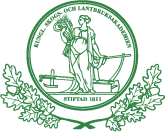 Kungl. Skogs- och Lantbruksakademien (KSLA) håller seminarium den 21:e mars om hållbart vattenbruk. Programmet ser väldigt lovande ut med, bland andra, inbjudna talare Barry Costa-Pierce och Carrie Byron från USA och Thierry Chopin från Kanada. Sista anmälningsdagen är den 14e mars.
Kungl. Skogs- och Lantbruksakademien (KSLA) håller seminarium den 21:e mars om hållbart vattenbruk. Programmet ser väldigt lovande ut med, bland andra, inbjudna talare Barry Costa-Pierce och Carrie Byron från USA och Thierry Chopin från Kanada. Sista anmälningsdagen är den 14e mars.
Läs mer och anmäla på länken nedan.
Aquaculture is said to be the world’s fastest growing food enterprise. It supplies a growing global population with nutritious food from aquatic animals and plants. However, the production forecasts to 2050 show that global aquaculture production will remain dominated by Asia (~80–90% of world production) while the rest of the world shows very little or no growth. Hyperinflation of the global growth of aquaculture outside of Asia confuses policy-makers, journalists, and the public and may lead to misperceptions that aquaculture is growing massively everywhere and must be severely regulated.
Professor Barry Costa-Pierce, University of New England, is a leading scientist within the fields of fisheries and aquaculture. He takes on the real-world problem of food sufficiency through transdisciplinary research, including ecological, economic and social aspects of sustainable aquaculture. Professor Costa-Pierce is the 4th holder of the KSLA Wallenberg professorship. During his year in Sweden, Professor Costa-Pierce has been working at SWEMARC, the Mariculture Research Centre at the University of Gothenburg. Along with his research, he has been instrumental in developing graduate programs, training the next generation of ocean food systems professionals, in Gothenburg, Scandinavia and the US.
In his keynote speech, Professor Barry Costa-Pierce will talk about the development of a transdisciplinary, ecosystems ecology framework that identifies the diversity of fisheries and aquaculture production systems as well as the modelling of functional connections between the systems. He underlines the need for a broader understanding of the typologies and local to global value chains. His speech will be followed by presentations by international and national researchers on sustainable aquaculture connected closely to fisheries, marine ecosystems, communities, and the global to local context of coastal developments.
